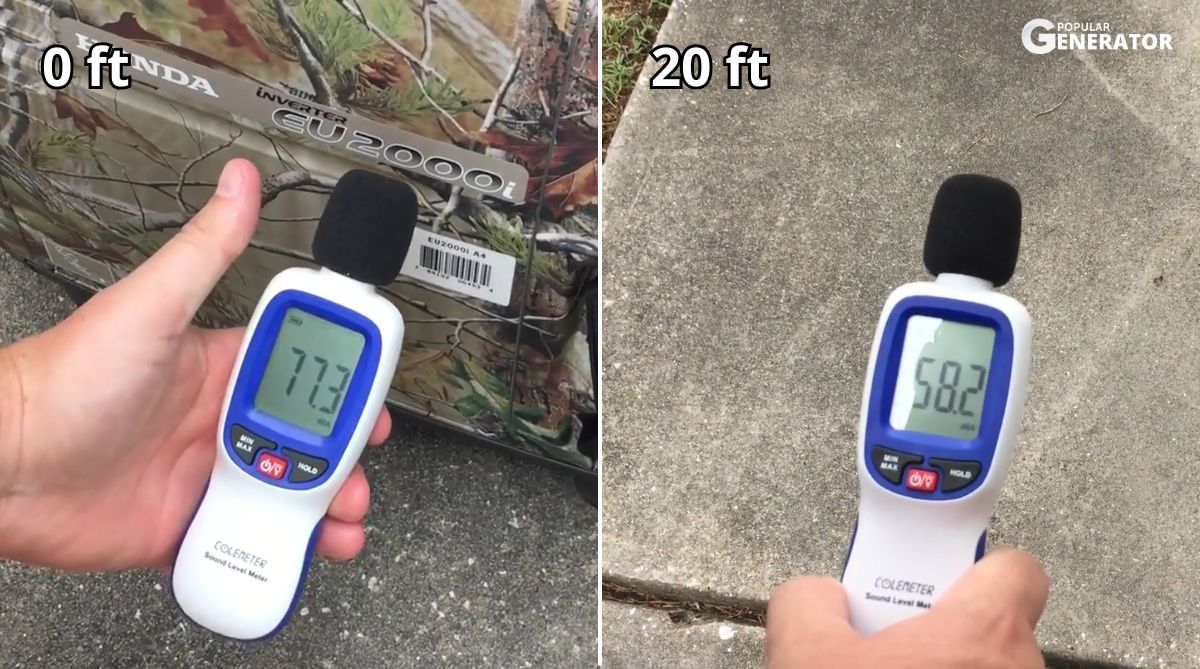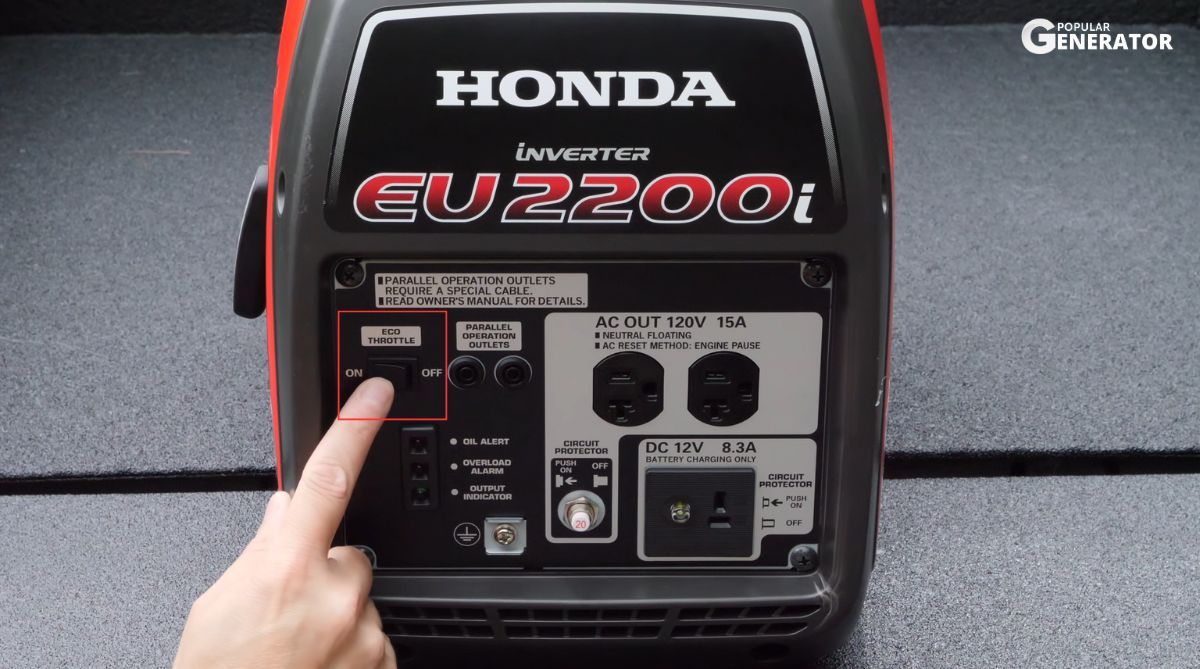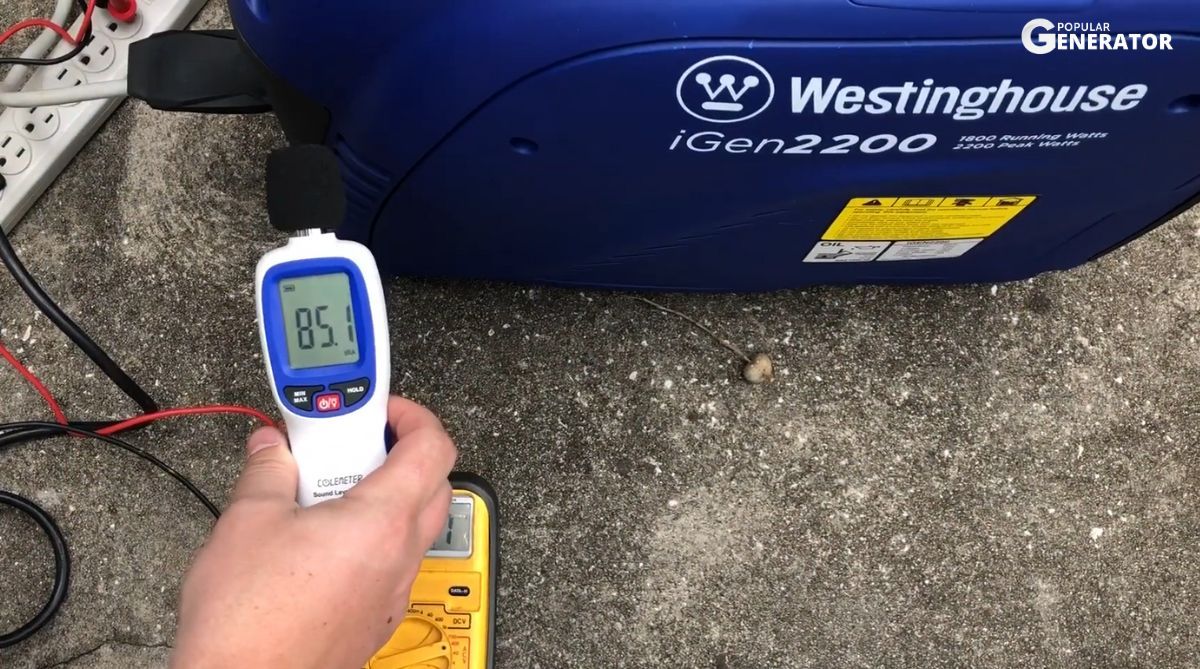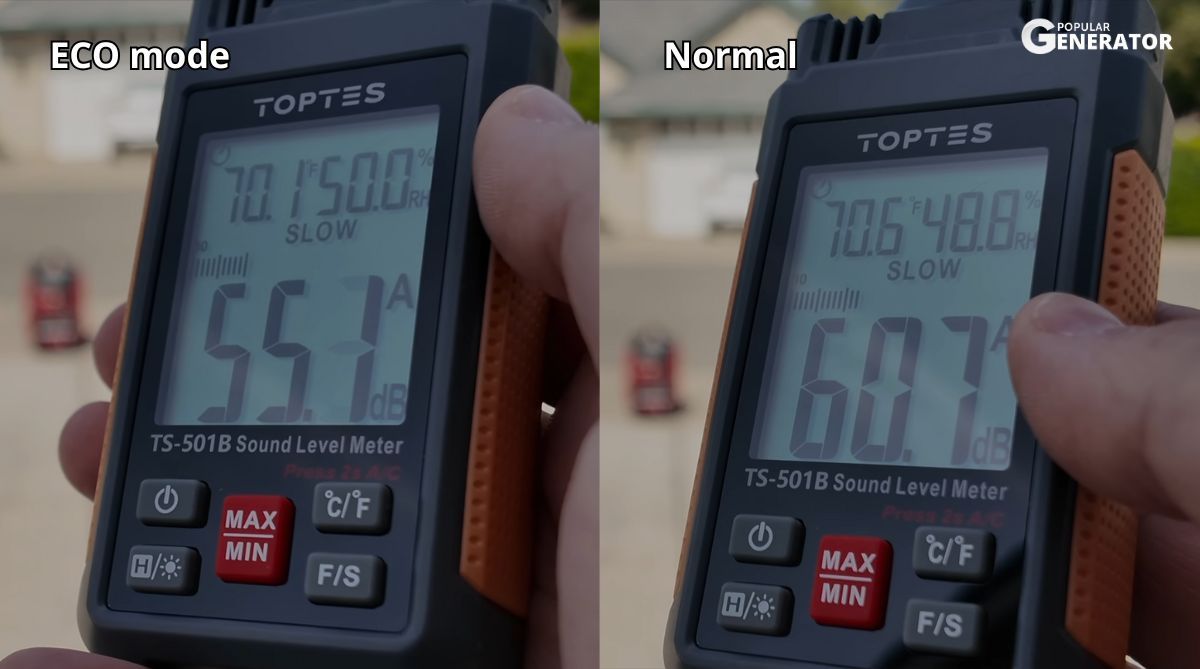That's why we took the time to test over 15 different quiet models, spoke with dozens of real users, and learned from people who actually work in the generator industry. In this guide, we have presented the top quiet generators of 2025 in simple and easy-to-read explanations so that you can choose the right one without being puzzled.
What’s Considered “Quiet” for Generators?
We get asked this a lot, and honestly, it's a wonderful question. Not every generator is made the same in regard to loudness. So what exactly is "quiet"?
Typically, a quiet generator will make below 60 decibels at 25–50% load. That's roughly as loud as chit-chat in a living room or background music in a coffee house.
It's not quiet and subdued, but it's soft enough that you're not likely to bother the folks next to you at a campsite or wake up the whole house in a power failure.
The noise levels you see on the box are generally measured at approximately 20 to 23 feet. That's the distance we employ as well in our testing below.
This is where inverter generators really shine. They control the engine speed based on how much power you really need. So, when you're not using them a lot, they are extremely quiet.
Best 5 Quiet Generators - Picked & Recommended by Experts
After testing over a dozen models and talking to real-world users, we've narrowed it down to the 5 quiet generators that actually live up to the promise.
-
Best Overall: Honda EU2200i Super Quiet Inverter Generator
-
Best Portable: A-iPower 1500W Super Quiet Generator
-
Best for Camping: Westinghouse iGen 2200 Inverter Generator
-
Best Dual Fuel: Champion 4500W Dual Fuel Generator
-
Best Budget: PowerSmart 2500-Watt Portable Inverter Generator
Before jumping into each generator's nitty-gritty details, we'd like to show you a quick chart of the noise levels as stated by the manufacturers.
That way, you can compare those numbers directly with our real-world test results for each model below.
| No | Model | Noise Level (dB) |
| 1 | Honda EU2200i | 48 |
| 2 | A-iPower Inverter | 52 |
| 3 | Westinghouse iGen 2200 | 52 |
| 4 | Champion 4500W Dual Fuel | 61 |
| 5 | PowerSmart 2500-Watt | 56 |
*Note: All of the information above comes directly from the manufacturers. Just keep in mind that these noise levels are measured while the generator is running at 25% load and from about 20 feet away.
In this section, we go beyond the specs to give you a realistic look at how each generator performs in everyday use. While all five models are known for their quiet operation, not all "quiet generators" are created equal.
1. Honda EU2200i Super Quiet Inverter Generator

Why You Should Get It: It’s a lightweight option that can be used at home, while camping, and at tailgating events thanks to how easy it is to transport.
Keep in Mind: The gas tank is awkwardly located, which made it difficult to fill.
The Honda EU2200i inverter generator is often considered the gold standard when it comes to quiet, portable inverter generators and for good reason.
Built with premium components and Honda's trusted engineering, this model delivers reliable, clean power with impressively low noise. It is ideal for camping, RVing, home backup, or any situation where silence matters.
Real Noise Level Testing
Honda rates the EU2200i at 48 to 57 decibels (according to the manufacturer), depending on the load. In practice, that means:
-
At idle using Eco Mode, it's about as quiet as a normal conversation
-
At 25 % load, you can stand next to it and still talk comfortably
-
At full load, it's comparable to the background hum of a refrigerator
In real test and use, we see that the generator is barely noticeable from 20 to 25 feet away. Eco Mode makes a big difference in keeping the noise low.
Overall, this is one of the quietest generators in its class, especially popular in campsites and quiet neighborhoods.

Eco-mode: I measured an average of about 58 dB from a distance of 20 feet. That level is impressively quiet and barely noticeable in a typical outdoor setting.
However, standing right next to the unit at 0 feet, the noise level jumped to just over 77 dB, which is expected for close-range measurements.
This result highlights that while the EU2200i is not silent up close, it delivers excellent noise performance at a reasonable distance, especially when running in Eco Mode.
Standard mode: With Eco Mode off, I got an average reading of around 61 to 62 dB from 20 feet away. Still very quiet, especially for a generator with this much power.

What really surprised me was when I compared it to the other models with the same capacity (2200 watts). That one hit about 67 to 70 dB under the same conditions.
That’s a pretty big difference and shows just how much Honda improved the design in terms of noise reduction.
Best For
-
Campers and RV owners who value peace and quiet
-
Homeowners who need a silent backup solution
-
Professionals working in noise-sensitive areas
2. Westinghouse 2200 Peak Watt Super Quiet

Why You Should Get It: It’s a lightweight option that can be used at home, while camping, and at tailgating events thanks to how easy it is to transport.
Keep in Mind: The gas tank is awkwardly located, which made it difficult to fill.
If you're looking for a super quiet generator that won’t ruin the peace at your campsite, the Westinghouse iGen2200 should be on your list.
According to the manufacturer, it runs at 52 dB(A) at 25% load, which is about as loud as a quiet conversation. But we went a step further and tested it ourselves.
The actual noise level was measured when starting a 1750-watt dryer on a low setting, running at approximately 25% load, and recorded at 54 dB(A).
This level was higher than the manufacturer’s claimed noise rating.
While it might seem that the sound was mostly from the dryer itself, measurements were taken multiple times from 23 feet away, even while seated in the living room, which confirmed the elevated noise level.
With Eco mode ON, the noise level was around 70 dB(A) from 5 feet away and about 65–68 dB from 20 feet under an 80% load.
That's still pretty quiet, especially for a generator with 1800 running watts packed into a lightweight, compact design.

Whether you’re powering small appliances, charging phones, or just need a reliable backup, this generator delivers clean, quiet power without taking up much space.
It might not beat Honda EU2200i in silence, but it comes impressively close at a more affordable price.
Who It’s Good For
This isn’t the generator for powering your whole house, but for smaller setups, it’s a solid option:
-
Great for camping or tailgating
-
Keeping essential appliances running during short outages
-
Lightweight (46 lbs) and easy to carry
-
Perfect for powering sensitive electronics
3. Champion 4500W Dual Fuel Generator

Why You Should Get It: It’s a lightweight option that can be used at home, while camping, and at tailgating events thanks to how easy it is to transport.
Keep in Mind: The gas tank is awkwardly located, which made it difficult to fill.
When it comes to choosing a quiet generator, the Champion 4500W Dual Fuel Generator might not immediately stand out as the quietest option in its category, but it’s all about understanding the power you’re getting for the noise it makes.
As someone who's used this generator for a while, I can tell you that it offers a great balance of power, versatility, and surprisingly decent noise control, especially given its impressive 4500 watts.
The Champion 4500W Dual Fuel generator operates at around 61 dB(A) at 23 feet under normal conditions, which is pretty average for this size of generator.
-
At Half Load (50%): When you push the Champion 4500W to around 50% load, you’ll notice the noise level bumps up to around 62-63 dBA). I hooked it up to my tailgate setup, connected a voltmeter, and fired up a microwave and a hair dryer at the same time.
-
Under Full Load: If you’re running it at a full load (around 4325 watts that I calculated), you might see the noise level peak at about 64-65 dB. It’s louder than a quiet inverter generator, but that’s to be expected given the power output.
With 4500 starting watts and 3650 running watts, the Champion 4500W is capable of running multiple appliances or even acting as backup power for your house or RV.
For a generator of this power, the noise level is actually quite fair.
When I compared to smaller, more portable generators (like Honda EU2200i or Westinghouse iGen2200), the noise will definitely be louder. Those smaller models might operate around 50-55 dBA, which is quieter, but they can’t produce nearly as much power.
Who It’s Good For
This generator isn’t the lightest or quietest in the portable category, but it makes up for that with strong, reliable performance:
-
Those needing more power for multiple high-wattage devices
-
RV users running A/C, microwave, fridge, and more
-
Home backup with extended runtime needs
-
Users who prefer longer fuel capacity over compact size
-
Campers and tailgaters who don’t mind a bit more noise
4. PowerSmart 2500-Watt Portable Inverter Generator

Why You Should Get It: It’s a lightweight option that can be used at home, while camping, and at tailgating events thanks to how easy it is to transport.
Keep in Mind: The gas tank is awkwardly located, which made it difficult to fill.
The PowerSmart 2500-Watt Portable Inverter Generator is hands-down one of the best budget picks I’ve come across. I’ve used it on weekend camping trips, for small jobs around the house, and during a short power outage, and it’s honestly better than I expected for the price.
You’re not going to get Honda-level silence, but for a generator that costs less than half as much, the noise control is surprisingly good. A lot of budget generators sound like lawnmowers. It’s clean, smooth, and stays within that sweet spot where it won’t disturb everyone around you.

With nothing plugged in and Eco Mode running, it was really quiet. I measured around 55 to 60 dBA from about 23 feet away. You could easily talk over it without raising your voice.
I plugged in a mini fridge and a small coffee maker, totaling 1200 watts (at half load), and the noise level rose to about 64 dBA.
You can hear it running in the background, but it’s not annoying at all. In fact, I’ve had conversations at work that were louder than this generator.
At full load, I pushed it with a hair dryer and an electric skillet just to see how it handled under pressure. The sound went up to around 65-66 dBA, but it didn’t scream or choke like some cheaper models. It just gave off a steady hum and kept running without issue.
Who It’s Good For
This isn’t your “run-the-whole-house” backup, but for smaller setups, it’s a champ:
-
Great for camping or tailgating
-
Solid choice for keeping your essentials running in a short outage
-
Lightweight enough (around 40 lbs) to carry with one hand
-
Safe for laptops, phones, and other electronics thanks to inverter power
Final Thoughts And Recommendations On The Quietest Generators
At the end of the day, the best quiet generator isn’t just the one that makes the least noise, it’s the one that actually fits your needs.
If your goal is peaceful camping or discreet backup power during an outage, go with a compact inverter generator that’s easy to carry and runs quietly. Just make sure it’s got enough wattage to handle what you actually plan to use like a small AC, fridge, or some lighting.
Don’t sacrifice power just for silence. There’s a balance to strike, and the models I’ve listed hit that sweet spot: quiet enough for the woods, strong enough for emergencies, and efficient enough to run without eating through fuel.
Choosing The Best Quiet Generator
When you're picking out a quiet generator, it’s not just about finding the one with the lowest noise rating. There’s a lot more to think about, especially if you want something that actually fits your needs.
Noise level (dBA)
The sweet spot is usually under 60 dBA at about 25% load. That’s quiet enough to hold a conversation nearby. Inverter generators tend to be the quietest out there.
How much power you need
Think about what you actually plan to run. A phone charger and a fan? Or an RV air conditioner and a fridge? Don’t overspend on power you’ll never use — but also don’t cheap out and end up short.
Inverter or not?
Inverter generators are quieter, more fuel-efficient, and safe for electronics like laptops and phones. Conventional ones are louder and heavier but usually cheaper for higher wattage.
Fuel type
Most generators run on gas, but dual-fuel options (gas and propane) are worth it if you want backup fuel options during emergencies.
How long it runs
Check the runtime at 25% or 50% load. A bigger fuel tank usually means longer runtime, but also more weight. It's all about what matters more to you.
Portability
If you plan to move it around — for camping, tailgating, or work — make sure it’s not a beast to lift. Under 50 lbs is great, but wheels and handles can make a big difference too.
Can you link two together?
Some small generators let you run two in parallel to double the power. That’s a nice feature if you want flexibility.
Frequently Asked Questions – FAQs
1. What is the quietest generator?
The quietest generators are typically inverter models, with noise levels ranging between 50-60 dBA at a 25% load. Generators like the Honda EU2200i or Westinghouse iGen2200 are among the quietest options, often used for camping, tailgating, and RVs.
2. How loud is a quiet generator?
Quiet generators typically have noise levels under 60 dBA. For comparison, this is similar to a normal conversation or background music. Noise levels can vary based on load and distance from the generator.
3. Can you use a quiet generator in an RV?
Yes, many quiet generators are perfect for RV use. They can power essential appliances like lights, fans, and small air conditioners, all without disturbing the peace. Inverter generators like the Honda EU2200i or Westinghouse iGen2200 are popular choices for RVers.
4. What size generator do I need for camping?
For camping, you typically need a generator that can power smaller appliances like lights, a small fan, or a portable fridge. A generator with around 2000 to 3000 watts should be sufficient, such as the Champion 2000-Watt or Westinghouse iGen2200.
5. How long can a quiet generator run on a full tank of gas?
Runtime depends on the generator's fuel tank capacity and the load. On average, most quiet generators run between 6 to 12 hours at 25% load. For example, the Westinghouse iGen2200 can run up to 12 hours on a 1.2-gallon tank at 25% load.
6. Are quiet generators good for sensitive electronics?
Yes, inverter generators are designed to produce clean power with low Total Harmonic Distortion (THD), making them safe for sensitive electronics like laptops, phones, and TVs.
7. Can I use a quiet generator during a power outage?
Absolutely. Quiet generators are great for home backup during short power outages, especially for powering essential appliances like refrigerators, lights, and fans. They provide a more peaceful alternative to traditional generators.










